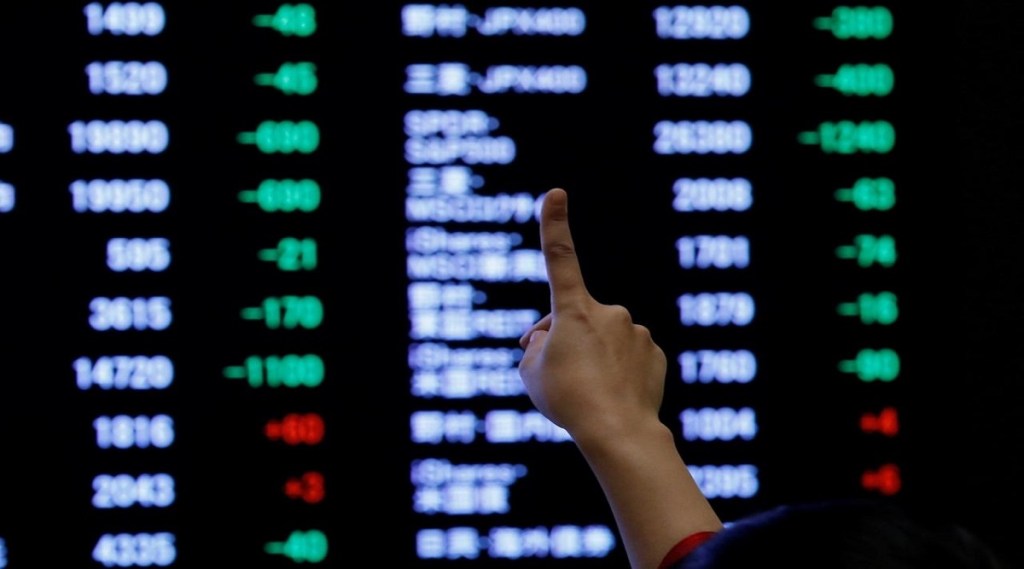Sensex, Nifty have entered the month of June in red after having ended with losses in the previous month. Volatility has been the buzzword on Dalal Street as benchmark indices danced between gains and losses. Foreign investors continue to remain net sellers of domestic stocks, pulling out more than Rs 40,000 crore during May. To battle the volatility and range bound movement on Dalal Street, analysts have been recommending stock-specific action. Yes Securities has picked four stocks for the month of June that they believe could rally. These include Maruti Suzuki India, State Bank of India, Tech Mahindra, and Automotive Axles.
Maruti Suzuki: BUY
Target: Rs 9,957
Upside: 26%
The auto giant’s stock is expected to zoom 26% in the next 12 months to hit a target of Rs 9,957 apiece from the current market price of Rs 7,906 per share. Yes Securities said that Maruti Suzuki is targeting a 25% growth in volumes for FY23 to surpass an output of 2 million, its highest ever in a year. “The company will introduce new products across price points, from its entry level hatchback to a premium crossover and a mid-sized sports utility vehicle (SUV), to win back market share and meet the target,” they added.
Maruti’s gross margins expanded ~180bp on-quarter basis at 26.5% despite inflation in raw materials. Analysts expect ~500bps margins expansion over FY22-24E resulting in healthy EBIDTA CAGR of ~53%.
State Bank of India (SBI): BUY
Target: Rs 655
Upside: 40%
The largest public sector lender in the country has seen its stock outperform the benchmarks this year, marginally rising so far in 2022 while Nifty and Sensex are down. SBI’s management believes corporate loan growth will be healthy. The unutilised corporate working capital limits at SBI amounted to Rs 2.76 lakh crore as of March compared with Rs 3.1 lakh crore as of December. For term loans, the un-availed limit amounts to Rs 2 lakh crore, compared with Rs 2.1 lakh crore as of December.
“In general, the processing fees were subdued during FY22 due to tepid new proposals, but management expects an improvement here. Management sees healthy opportunity in forex income and cross-sell, where the fee income for FY22 has gone up 44% and 32% YoY, respectively,” analysts added.
Tech Mahindra: BUY
Target price: 1,380
Upside: 21%
IT major Tech Mahindra has seen its share price tank 36% so far in 2022. Yes Securities has pinned a target price of Rs 1,380 on the scrip, translating to a strong upside from the current market price of Rs 1,134. Tech Mahindra’s deal wins are healthy, the firm reported deal wins of $1 billion in the January-March quarter thereby providing revenue growth visibility, according to Yes Securities. “Tech Mahindra is expected to benefit from rising 5G related deal momentum as it remains highly dependent on telecom vertical (~40% of revenue). The need to be 5G ready would continue to drive 5G related deals; While the enterprise vertical seems to be getting traction led by BFSI and Technology verticals,” analysts said.
The brokerage firm said that Tech Mahindra would mostly focus on organic growth in the current fiscal year. “Pricing action, increasing utilization, higher offshoring trend, and improved employee pyramid would support operating margin going ahead,” analysts added.
Automotive Axles: BUY
Target price: 2,141
Upside: 32%
Automotive Axles is a joint venture of Kalyani Group and Meritor Inc., USA with manufacturing facilities in Mysore, Jamshedpur, Pantnagar, and Hosur. The company caters to clients such as Ashok Leyland, Tata Motors, Mahindra & Mahindra, Daimler, Volvo, Eicher Commercials, Bharat Forge for defence, Caterpillar for Specialty Axle, VJF facilities at Jabalpur for the defence and they also do business with Bamel Godrej and Cargotec.
“With improving economic activity and better freight rates, there is positive recovery in the CV production volumes. We expect AAL to outperform the industry supported by its focus on 4 new growth pillars like increased contribution from new products, focus on exports, new segment entry,” Yes Securities said. “We expect the margins to improve from current level supported by cost reduction measures taken by the management, expected better product mix and operating leverage with higher utilization levels,” they added.


